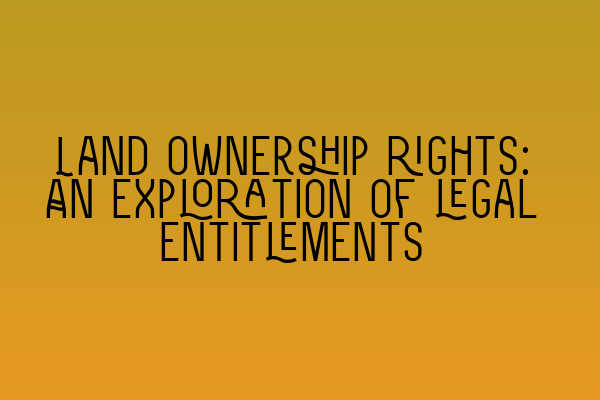Land ownership rights: An exploration of legal entitlements
When it comes to land ownership, understanding the legal entitlements involved is crucial. Whether you are a property developer, a homeowner, or someone looking to invest in real estate, knowledge of land ownership rights can help protect your interests and avoid potential legal disputes. In this article, we will explore the various aspects of land ownership rights and the legal frameworks that govern them.
The concept of land ownership
The concept of land ownership dates back centuries and is deeply rooted in legal traditions. In general, land ownership grants the owner the exclusive rights to use and enjoy the land, subject to any legal restrictions or limitations imposed by the state or other interested parties. The ownership of land is backed by laws and regulations that provide a framework for the transfer, use, and protection of land rights.
It is important to note that land ownership rights can vary depending on the jurisdiction and the type of land in question. In some cases, land may be privately owned by individuals or entities, while in other cases, it may be held by the state or other public bodies.
The bundle of rights
Land ownership can be seen as a “bundle of rights” that includes various entitlements. These rights can be further categorized into two main types: rights in rem and rights in personam.
Rights in rem are rights that can be enforced against the whole world. They include rights such as the right to possess the land, the right to use the land, the right to transfer the land, and the right to exclude others from the land. These rights are considered absolute and can be defended in court if necessary.
Rights in personam, on the other hand, are rights that can be enforced only against specific individuals or entities. These rights include contractual rights, such as the right to lease or rent the land, and other personal obligations or agreements that pertain to the use of the land.
Legal challenges in land ownership
While land ownership rights provide a strong foundation for property ownership, there can be legal challenges that arise. It is important for landowners to be aware of these challenges and take proactive measures to minimize their impact.
One common legal challenge is boundary disputes. These disputes often arise when neighboring landowners have differing interpretations of their property boundaries. Resolving boundary disputes can be complex, involving surveys, title deeds, and expert opinions. Understanding the legal principles governing boundaries can help landowners navigate these issues and reach a satisfactory resolution.
Another legal challenge is the restriction on land use. In certain cases, governments or local authorities may impose restrictions on how land can be used. These restrictions can include zoning regulations, environmental considerations, and historical preservation requirements. Violating these restrictions can result in legal consequences, including fines and forced changes in land use. It is important for landowners to be informed about these restrictions and seek legal advice when necessary.
Moreover, adverse possession is another legal concept that can affect land ownership rights. Adverse possession allows someone who has occupied and used another person’s land without permission for a certain period of time to claim legal ownership. Understanding the intricacies of adverse possession and taking appropriate measures to protect your land from unauthorized occupation is essential.
Seeking legal assistance
Given the complexity and potential challenges of land ownership, it is prudent to seek legal assistance when dealing with property transactions or disputes. A qualified solicitor specializing in property law can provide invaluable guidance and ensure that your rights as a landowner are protected.
At SQE Property Law & Land Law, our team of experienced solicitors is well-versed in all aspects of land ownership rights. We have helped numerous clients navigate property transactions, resolve disputes, and safeguard their land ownership interests.
For a comprehensive guide on legal challenges in property transactions, we recommend reading our article: Legal challenges in property transactions: A comprehensive guide.
To avoid common pitfalls in property law, check out our article: Dominate Property Law Questions: Avoiding Common Pitfalls.
If you’re looking for land law revision tips and want to ace your exam preparation, be sure to read our article: Land Law Revision Tips: Ace Your Exam Preparation.
When it comes to balancing development and sustainability in land law, environmental ethics play a crucial role. Learn more in our article: Environmental Ethics in Land Law: Balancing Development and Sustainability.
For real-world scenarios and case studies in property law, our article provides valuable insights: SQE case studies in property law: Real-world scenarios.
If you have any questions or need assistance with land ownership rights, feel free to get in touch with our expert team at SQE Property Law & Land Law. We are here to help you navigate the complex landscape of land ownership.
